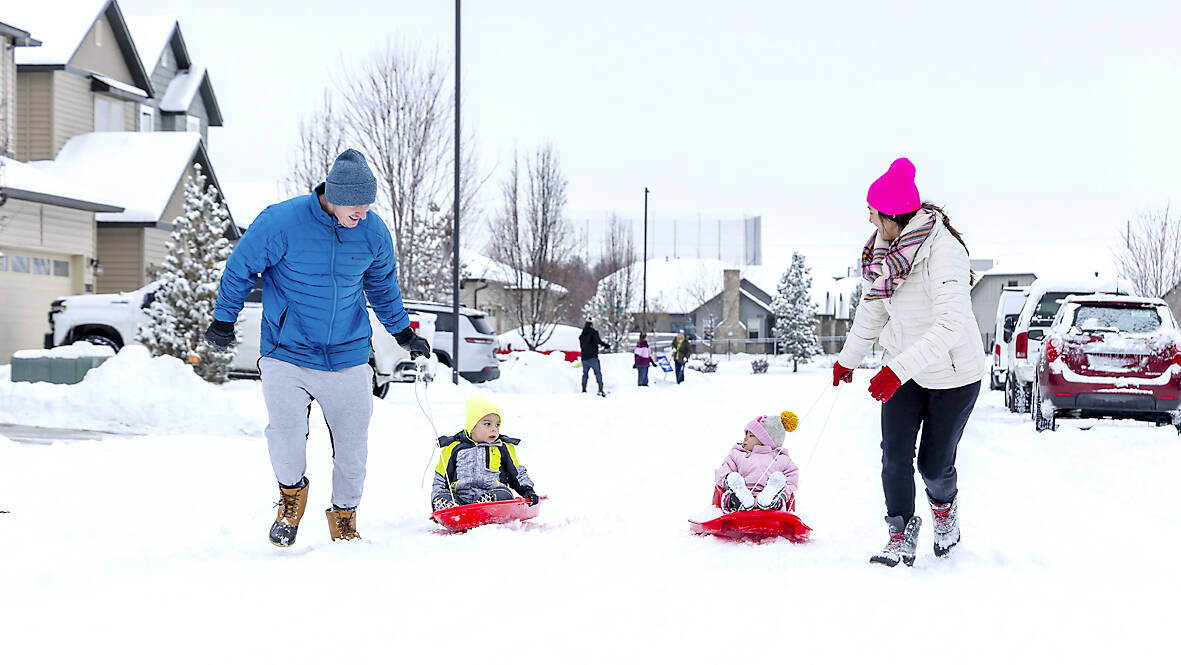From Cain and Abel and the Brothers Karamazov to Cinderella, the warmth and support provided by siblings has hardly been taken for granted.
Now, researchers have found that children who moan about their brothers and sisters may have good reason to complain: the more siblings teenagers have, the more it hits their happiness, they claim.
A study of secondary schoolchildren in the US and China found that those from larger families had slightly poorer mental health than those from smaller families. The greatest impact was seen in families with multiple children born less than a year apart.

Photo: AP
Doug Downey, a professor of sociology at Ohio State University, said previous work in the field had revealed a mixed picture of positives and negatives for children with more siblings, adding that the latest results “were not a given.”
The researchers asked 9,100 eighth graders in the US and 9,400 in China, with an average age of 14, a range of questions about their mental health, though the specific questions varied between the countries. In China, the teenagers with no siblings fared best for mental health. In the US, children who had no siblings or only one were found to have similar mental health.
Overall, mental health was worse the more siblings the teenagers had, with greater impacts seen for teenagers with older siblings, and when brothers and sisters were closely spaced in age.
Writing in the Journal of Family Issues, Downey and his colleagues argue that the findings are in line with the “resource dilution” explanation, the driving force behind the unwritten formula that states that the number of balls dropped rises, sometimes dramatically, with the number of siblings born.
“If you think of parental resources like a pie, one child means that they get all the pie,” Downey said. “But when you add more siblings, each child gets fewer resources and attention from the parents, and that may have an impact on their mental health.”
That teenagers fared worse when their siblings were a similar age backs up the thinking, the researchers believe.
But there are other potential explanations. For example, the teenagers with the best mental health came from families with the highest socioeconomic advantages. In the US, these were often families with only one or two children. In China, it was the families with one child. In line with China’s one child policy, about a third of Chinese children were only children, compared with 12.6 percent of US children.
With the rise of “one and done” families, researchers are increasingly keen to tease out the impact of brothers and sisters on mental health and other factors. Previous studies suggest a slew of positive impacts linked to siblings, suggesting a complex picture of pros and cons.
Earlier work by Downey showed that children with more siblings got along better with others at nursery, and were less likely to divorce in later life — perhaps because they already had some experience at navigating close relationships. Meanwhile, a 2016 study of more than 100,000 Norwegian children found better mental health across the ages in larger families.

On April 26, The Lancet published a letter from two doctors at Taichung-based China Medical University Hospital (CMUH) warning that “Taiwan’s Health Care System is on the Brink of Collapse.” The authors said that “Years of policy inaction and mismanagement of resources have led to the National Health Insurance system operating under unsustainable conditions.” The pushback was immediate. Errors in the paper were quickly identified and publicized, to discredit the authors (the hospital apologized). CNA reported that CMUH said the letter described Taiwan in 2021 as having 62 nurses per 10,000 people, when the correct number was 78 nurses per 10,000

As we live longer, our risk of cognitive impairment is increasing. How can we delay the onset of symptoms? Do we have to give up every indulgence or can small changes make a difference? We asked neurologists for tips on how to keep our brains healthy for life. TAKE CARE OF YOUR HEALTH “All of the sensible things that apply to bodily health apply to brain health,” says Suzanne O’Sullivan, a consultant in neurology at the National Hospital for Neurology and Neurosurgery in London, and the author of The Age of Diagnosis. “When you’re 20, you can get away with absolute

May 5 to May 11 What started out as friction between Taiwanese students at Taichung First High School and a Japanese head cook escalated dramatically over the first two weeks of May 1927. It began on April 30 when the cook’s wife knew that lotus starch used in that night’s dinner had rat feces in it, but failed to inform staff until the meal was already prepared. The students believed that her silence was intentional, and filed a complaint. The school’s Japanese administrators sided with the cook’s family, dismissing the students as troublemakers and clamping down on their freedoms — with

As Donald Trump’s executive order in March led to the shuttering of Voice of America (VOA) — the global broadcaster whose roots date back to the fight against Nazi propaganda — he quickly attracted support from figures not used to aligning themselves with any US administration. Trump had ordered the US Agency for Global Media, the federal agency that funds VOA and other groups promoting independent journalism overseas, to be “eliminated to the maximum extent consistent with applicable law.” The decision suddenly halted programming in 49 languages to more than 425 million people. In Moscow, Margarita Simonyan, the hardline editor-in-chief of the